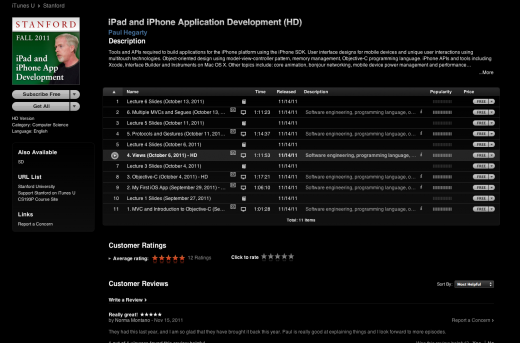[5 enlaces][5 links] : Stanford iPhone IPad, locura #socialmedia, 100 #web20 tools, school ruins y #web30
Hoy vamos a traer un variaito sevillano, para nuestra sección [5 enlaces][5 links] que tenemos abandonada hace mucho tiempo ...
1)Stanford University Offers Free Course on Developing Apps for iPhone and iPad en The NextWeb.
Stanford University’s School of Engineering has a history of offering
courses on some pretty interesting products for free online. Many of
them have been through Apple’s iTunes U program, and this latest is no
exception.
Stanford’s iPad and iPhone Application Development (CS193P) course is now available for free on iTunes U. The
course includes lectures and lessons focused on iOS 5 app development.
It’s broken out over 11 episodes that consist of videos and slides. (...)
2) Post: la locura, antesala de la rentabilidad en el social media en El blog de Benito Castro
 Acabamos de clausurar hace horas como aquel que dice el EBE11,
Acabamos de clausurar hace horas como aquel que dice el EBE11,
y regreso a mi blog que andaba bastante desantendido. Y no sabéis lo
que me alegro. Guiado aún por el estrés y la gran efervescencia vivida
entre las personas que iban y venían (conferenciantes, viejos y jóvenes
amigos, medios de comunicación, empresas, particulares, etc) me
encuentro en un punto de recuperación de constantes vitales como aquel
que dice.
Mentalmente, las neuronas se me estarán moviendo como
las burbujas de un gin tonic recién servido. Me parece a mi. La lectura
de post de gente interesante me moviliza a pensar en nuevas ideas y en
adaptaciones de otras viejas. Todo lo percibo bastante movido. Todo
podría relacionarse, sin ánimo de ofender que se dice, como una especie
de locura, lo que implica una nueva perspectiva de aproximación y
análisis del fenómeno del social media.
Cada 60 segundos, se publican más de 98,000 tweets, 1500 posts en blogs y 655.000 mensajes quedan anotados en el muro de Facebook (...)
3)100 Essential Web 2.0 Tools for Teachers en Web20 education
are new web 2.0 tools appearing every day. Although some of these tools
were not originally meant for use in the classroom, they can be
extremely effective learning tools for today’s technology geared
students and their venturesome teachers. Many of these teachers are
searching for the latest products and technologies to help them find
easier and efficient ways to create productive learning in their
students. More and more teachers are using blogs, podcasts and wikis, as
another approach to teaching. We have created a list of 100 tools we
think will encourage interactivity and engagement, motivate and empower
your students, and create differentiation in their learning process.
and open source software that makes personal publishing as easy as word
processing. Make your life and your students’ life easier by keeping a
classroom or subject blog.
4. Quizlet More than just flashcards and very easy to use. Get students started on good study habits. (..)
4) Para la lectura la revista de Noviembre Inside Learning Technologies and Skill... portada How subject-based education in school ruins our conception of learning ... 162 páginas
![]() 5)Web 3.0, Web Semántica o Web Social. Evolución y perspectivas
5)Web 3.0, Web Semántica o Web Social. Evolución y perspectivas
La
Web 3.0 y la Web Semántica
Por Jenaro Villamil
Jenaro Villamil
En 2001, prácticamente al mismo tiempo que se “bautizaba” a la web 2.0,
Tim Berners Lee, creador de la World Wide Web, acuñó otro término: el de la
“web semántica” para referirse a un medio cibernético capaz de de interpretar e
interconectar un número mayor de datos, lo que permitiría el avance en el campo
del conocimiento.
 Berners Lee afirmó en la revista Scientific American que esta transformación traería aparejada
Berners Lee afirmó en la revista Scientific American que esta transformación traería aparejada
una evolución en el conocimiento humano sobre investigaciones genéticas,
tratamiento farmacológico de enfermedades hasta ahora incurables, entre otros
avances, que no quedaban muy claros entonces. (...)
- Bitácora de eraser
- Log in or register to post comments




